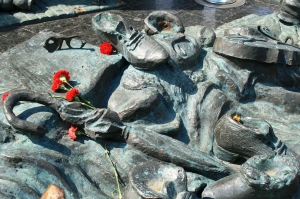
I just finished reading The Boy on the Wooden Box to my son, who I homeschool in his 5th grade year. Interestingly enough, I’ve been simultaneously reading Ordinary Men for a class I’m taking on “Why God Allows Evil.” Both books deal with the Holocaust. The book I’m reading to Josh, however, deals with a young boy, named Leon Leyson who is about my son’s age, who survives in the Jewish Ghettos set up in Poland, and eventually makes it through the war on account of one man named Oskar Schindler. If it wasn’t for this man’s actions, Leon would not have survived the Nazi’s “Final Solution.” Instead, he not only survived but made it to the United States and spent the rest of his life in California, telling his story in his later years, and having the book written and not yet published before his death in 2013.
The amazing contrast between these two books is that The Boy on the Wooden Box depicts how a regular boy, just like my son, got thrown into horrific conditions and how his life so rapidly changed to fighting for his survival with his family members. They all had the assistance of one generous businessman, Schindler. The other book, Ordinary Men, tells the story of how a group of policeman were turned into mass murderers in the face of the cultural climate and pressures on them to “perform their duties.”
The class I’m taking points out that any one of us might become like one of these “ordinary men” and be Auschwitz-enabled (one of the extermination camps set up by the Nazis). Given the circumstances of these policemen, assuming they were men who were indoctrinated into thinking that the Jews were parasites who caused the fall of the first World War, and somehow became less than human, could we say we wouldn’t do the same? Of course our initial reaction would be “absolutely not,” but if we were really honest, each person, given the pressures these policemen faced, might pull the trigger as well. (This was heavily debated in my class, some arguing that true Christians would not have committed murder. We don’t know the individual belief systems of the police battalion, so it is difficult to say, other than they were coerced into killing.) All of mankind has the ability to sink to the lowest levels of evil, as been proven by the second Word War.
But not all of us do! There is always a light in the darkness somewhere if one looks hard enough to find it, or is brave enough to light it. Oskar Schindler was such a man. Despite the odds of placing himself in serious danger, he hired hundreds of Jews to help him at his factory during the war. These Jews, he explained to the Nazis, were crucial to his operations as they were skilled workers, and indeed they were! Nonetheless, that didn’t stop the Nazis from murdering Jews, skilled or not. Schindler had a way with these men in authority, as he threw parties for them, bribed them at times, while keeping hundreds of these Jews alive during a time when the “Final Solution” was being implemented. Schindler put his life at risk for doing this saving act. Why? Why didn’t he become influenced like all the others around him to hate the Jews, to want to see them eliminated, to become like the other “ordinary men” of the murderous police battalion?
Leon Leyon states in his book: “As an influential Nazi, Schindler did have a choice. Countless times he could have abandoned us, taken his fortune, and fled. He could have decided that his life depended on working us to death, but he didn’t. Instead, he put his own life in danger every time he protected us for no other reason than it was the right thing to do. I am not a philosopher, but I believe that Oskar Schindler defines heroism. He proves that one person can stand up to evil and make a difference.” 1
So even though the course I’m taking shows that inside every man’s heart is the potential for the greatest of evils, Leon’s story shows that also there are heroes among us, ones who are not afraid to do the right thing despite the dangers. It only takes one match to light up a darkened room. Be the match!
1 Leon Leyson, The Boy on the Wooden Box, New York, NY Antheneum Book, 2013, 204.
Image credit: Louis Bülow ©2008-10





